高中英语语法讲练一句子成分;简单句并列句和复合句--高中英语
高中英语基础语法复习一:句子成分、简单句、并列句和复合句
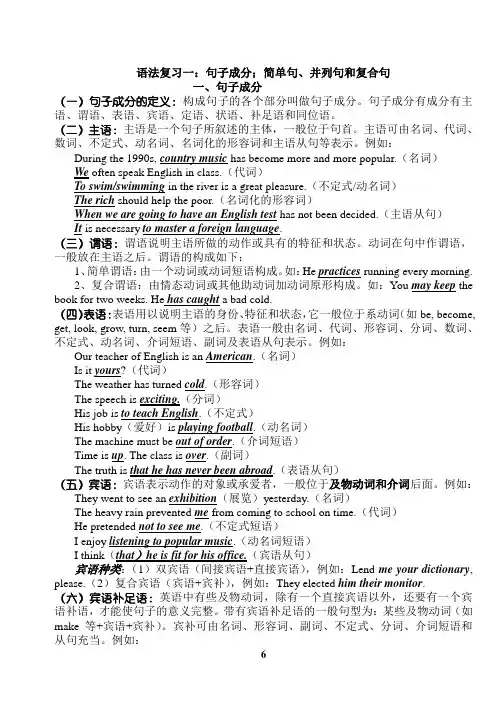
语法复习一:句子成分;简单句、并列句和复合句一、句子成分(一)句子成分的定义:构成句子的各个部分叫做句子成分。
句子成分有成分有主语、谓语、表语、宾语、定语、状语、补足语和同位语。
(二)主语:主语是一个句子所叙述的主体,一般位于句首。
主语可由名词、代词、数词、不定式、动名词、名词化的形容词和主语从句等表示。
例如:During the 1990s, country music has become more and more popular.(名词)We often speak English in class.(代词)To swim/swimming in the river is a great pleasure.(不定式/动名词)The rich should help the poor.(名词化的形容词)When we are going to have an English test has not been decided.(主语从句)It is necessary to master a foreign language.(三)谓语:谓语说明主语所做的动作或具有的特征和状态。
动词在句中作谓语,一般放在主语之后。
谓语的构成如下:1、简单谓语:由一个动词或动词短语构成。
如:He practices running every morning.2、复合谓语:由情态动词或其他助动词加动词原形构成。
如:You may keep the book for two weeks. He has caught a bad cold.(四)表语:表语用以说明主语的身份、特征和状态,它一般位于系动词(如be, become, get, look, grow, turn, seem等)之后。
表语一般由名词、代词、形容词、分词、数词、不定式、动名词、介词短语、副词及表语从句表示。
例如:Our teacher of English is an American.(名词)Is it yours?(代词)The weather has turned cold.(形容词)The speech is exciting.(分词)His job is to teach English.(不定式)His hobby(爱好)is playing football.(动名词)The machine must be out of order.(介词短语)Time is up. The class is over.(副词)The truth is that he has never been abroad.(表语从句)(五)宾语:宾语表示动作的对象或承爱者,一般位于及物动词和介词后面。
【句子结构】高中英语句子成分分析(简单句与复合句)
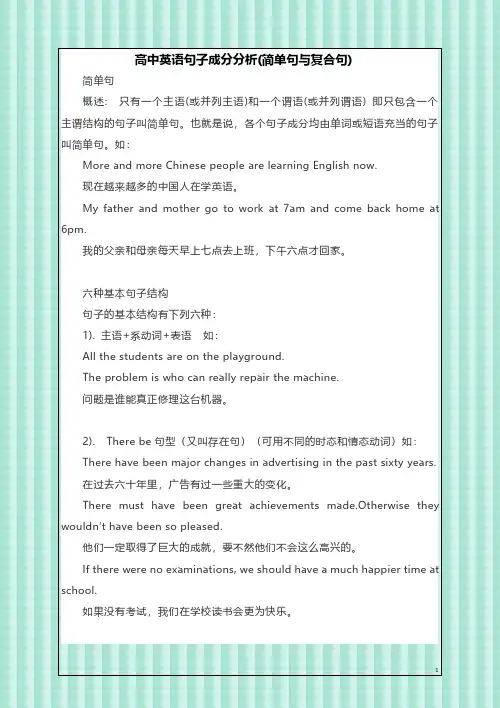
高中英语句子成分分析(简单句与复合句)简单句概述:只有一个主语(或并列主语)和一个谓语(或并列谓语)即只包含一个主谓结构的句子叫简单句。
也就是说,各个句子成分均由单词或短语充当的句子叫简单句。
如:More and more Chinese people are learning English now.现在越来越多的中国人在学英语。
My father and mother go to work at7am and come back home at 6pm.我的父亲和母亲每天早上七点去上班,下午六点才回家。
六种基本句子结构句子的基本结构有下列六种:1).主语+系动词+表语如:All the students are on the playground.The problem is who can really repair the machine.问题是谁能真正修理这台机器。
2).There be句型(又叫存在句)(可用不同的时态和情态动词)如:There have been major changes in advertising in the past sixty years.在过去六十年里,广告有过一些重大的变化。
There must have been great achievements made.Otherwise they wouldn’t have been so pleased.他们一定取得了巨大的成就,要不然他们不会这么高兴的。
If there were no examinations,we should have a much happier time at school.如果没有考试,我们在学校读书会更为快乐。
3).主语+谓语(不及物动词)如:We work hard at English.我们努力学习英语。
He doesn’t work here any longer.他已不在这儿工作了。
高考英语语法复习一:句子成分;简单句、并列句和复合句
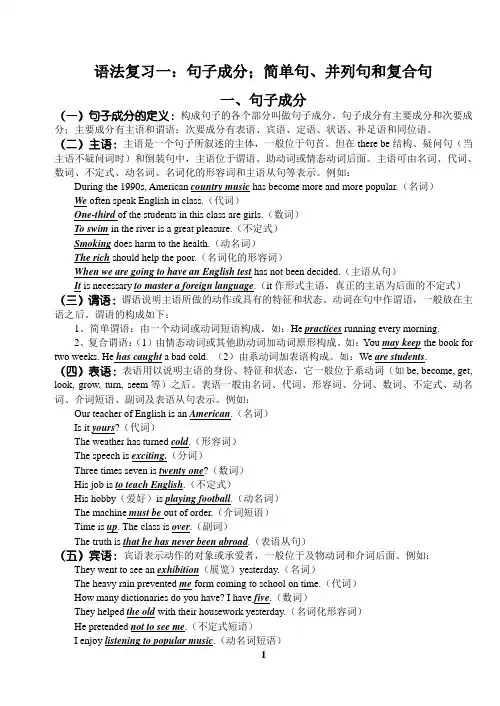
语法复习一:句子成分;简单句、并列句和复合句一、句子成分(一)句子成分的定义:构成句子的各个部分叫做句子成分。
句子成分有主要成分和次要成分;主要成分有主语和谓语;次要成分有表语、宾语、定语、状语、补足语和同位语。
(二)主语:主语是一个句子所叙述的主体,一般位于句首。
但在there be结构、疑问句(当主语不疑问词时)和倒装句中,主语位于谓语、助动词或情态动词后面。
主语可由名词、代词、数词、不定式、动名词、名词化的形容词和主语从句等表示。
例如:During the 1990s, American country music has become more and more popular.(名词)We often speak English in class.(代词)One-third of the students in this class are girls.(数词)To swim in the river is a great pleasure.(不定式)Smoking does harm to the health.(动名词)The rich should help the poor.(名词化的形容词)When we are going to have an English test has not been decided.(主语从句)It is necessary to master a foreign language.(it作形式主语,真正的主语为后面的不定式)(三)谓语:谓语说明主语所做的动作或具有的特征和状态。
动词在句中作谓语,一般放在主语之后。
谓语的构成如下:1、简单谓语:由一个动词或动词短语构成。
如:He practices running every morning.2、复合谓语:(1)由情态动词或其他助动词加动词原形构成。
如:You may keep the book for two weeks. He has caught a bad cold. (2)由系动词加表语构成。
高中英语语法之句子成分
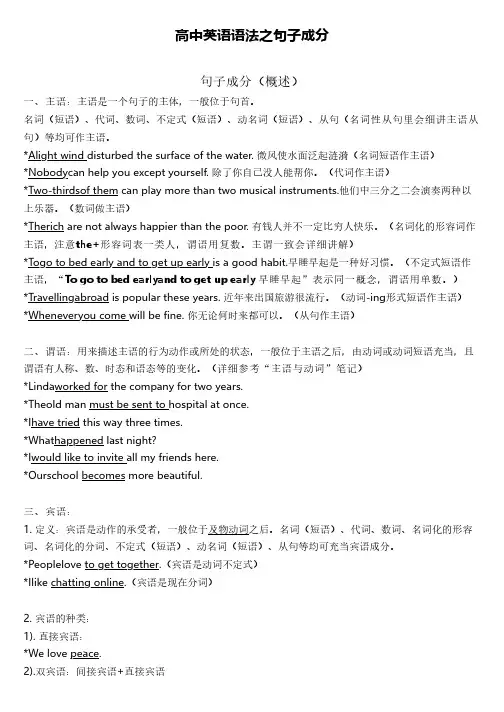
高中英语语法之句子成分句子成分(概述)一、主语:主语是一个句子的主体,一般位于句首。
名词(短语)、代词、数词、不定式(短语)、动名词(短语)、从句(名词性从句里会细讲主语从句)等均可作主语。
*Alight wind disturbed the surface of the water. 微风使水面泛起涟漪(名词短语作主语)*Nobodycan help you except yourself. 除了你自己没人能帮你。
(代词作主语)*Two-thirdsof them can play more than two musical instruments.他们中三分之二会演奏两种以上乐器。
(数词做主语)*Therich are not always happier than the poor. 有钱人并不一定比穷人快乐。
(名词化的形容词作主语,注意the+形容词表一类人,谓语用复数。
主谓一致会详细讲解)*Togo to bed early and to get up early is a good habit.早睡早起是一种好习惯。
(不定式短语作主语,“To go to bed earlyand to get up early 早睡早起”表示同一概念,谓语用单数。
)*Travellingabroad is popular these years. 近年来出国旅游很流行。
(动词-ing形式短语作主语)*Wheneveryou come will be fine. 你无论何时来都可以。
(从句作主语)二、谓语:用来描述主语的行为动作或所处的状态,一般位于主语之后,由动词或动词短语充当,且谓语有人称、数、时态和语态等的变化。
(详细参考“主语与动词”笔记)*Lindaworked for the company for two years.*Theold man must be sent to hospital at once.*Ihave tried this way three times.*Whathappened last night?*Iwould like to invite all my friends here.*Ourschool becomes more beautiful.三、宾语:1. 定义:宾语是动作的承受者,一般位于及物动词之后。
高考英语语法复习 ---简单句并列句复合句
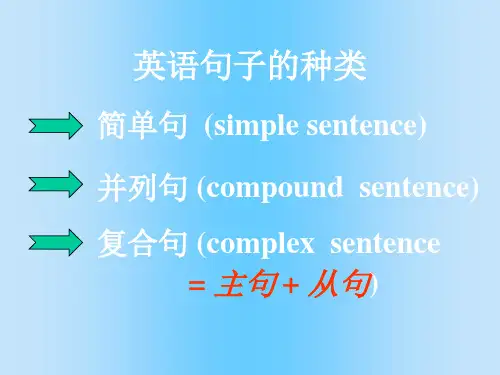
(武汉调研4月) Put yourself in situations where you will be forced to communicate in English, ___ you will see more progress over time. A. or B. so C. yet D. and (崇文4月) You must get up early in the morning, ___ we’ll have to leave without you A.and B. but C. or D. so
英语句子的种类
简单句 (simple sentence) 并列句 (compound sentence)
复合句 (complex sentence = 主句 + 从句)
简单句的五种基本句型
• 主语 + 不及物动词 ( S + Vi ) • 主语 + 及物动词 +宾语 ( S + Vt + O) • 主语 + 系动词 + 表 (S + LV + predicative) • 主语+双宾动词+间宾+直宾(S +Vt +O.indir+O. dir) • 主语 + 宾补动词 +宾语 +宾语补语 • (S + Vt. + O + O. compl) •There + be / stand/ lie / live...
其它平行结构:not…but…, either…or…, neither…nor, not only…but also…, would rather…than…(宁愿……不愿 ……), rather than(而不), as well as(既……也……)等。
高中英语语法专题知识点梳理总结与练习(并列句、定语从句、名词性从句、状语从句)
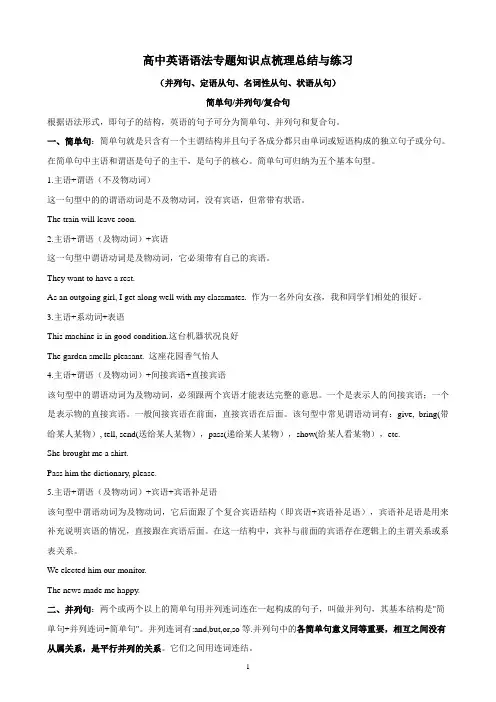
高中英语语法专题知识点梳理总结与练习(并列句、定语从句、名词性从句、状语从句)简单句/并列句/复合句根据语法形式,即句子的结构,英语的句子可分为简单句、并列句和复合句。
一、简单句:简单句就是只含有一个主谓结构并且句子各成分都只由单词或短语构成的独立句子或分句。
在简单句中主语和谓语是句子的主干,是句子的核心。
简单句可归纳为五个基本句型。
1.主语+谓语(不及物动词)这一句型中的的谓语动词是不及物动词,没有宾语,但常带有状语。
The train will leave soon.2.主语+谓语(及物动词)+宾语这一句型中谓语动词是及物动词,它必须带有自己的宾语。
They want to have a rest.As an outgoing girl, I get along well with my classmates. 作为一名外向女孩,我和同学们相处的很好。
3.主语+系动词+表语This machine is in good condition.这台机器状况良好The garden smells pleasant. 这座花园香气怡人4.主语+谓语(及物动词)+间接宾语+直接宾语该句型中的谓语动词为及物动词,必须跟两个宾语才能表达完整的意思。
一个是表示人的间接宾语;一个是表示物的直接宾语。
一般间接宾语在前面,直接宾语在后面。
该句型中常见谓语动词有:give, bring(带给某人某物), tell, send(送给某人某物),pass(递给某人某物),show(给某人看某物),etc.She brought me a shirt.Pass him the dictionary, please.5.主语+谓语(及物动词)+宾语+宾语补足语该句型中谓语动词为及物动词,它后面跟了个复合宾语结构(即宾语+宾语补足语),宾语补足语是用来补充说明宾语的情况,直接跟在宾语后面。
在这一结构中,宾补与前面的宾语存在逻辑上的主谓关系或系表关系。
高中写作句型练习-简单句,并列句,复合句
简单句:英语的五大基本句型!一、基本句型汉译英练习主谓结构说明:本结构是由主语加不及物的谓语动词构成, 常用来表示主语的动作。
如,The sun rises.主语可有修饰语---定语,如,The red sun rises.谓语可有修饰语---状语,如,The red sun rises in the east.翻译练习:1.你应当努力学习。
2.她昨天回家很晚。
3.那天早上我们谈了很多。
4.会议将持续两个小时。
5.在过去的十年里,我的家乡已经发生了巨大的变化。
6.这种事情全世界各地每天都在发生。
7.1919年,在北京爆发了“五.四”运动。
8.每天八时开始上课。
9.这个盒子重五公斤。
10.五年前我住在北京。
11.爱丽丝很会游泳。
12.约翰的父亲昨晚去世了。
13.秋天有些鸟飞到南方去。
14.我的爷爷早晨起得很早。
15.每天下午有许多学生到图书馆来借书。
二.Subject (主语) +Link. V(系动词) +Predicate(表语)此句型的句子有一个共同的特点:句子谓语动词都不能表达一个完整的意思,必须加上一个表明主语身份或状态的表语,才能表达完整的意思。
系动词主要包括:A)be动词。
如am,is are,was,were.如:He is clever.She is a beautiful girl.B)除了be 系动词外,还有一些动词也可以用作系动词,1)表感官的动词。
如:feel, smell, taste, sound, look等。
如:This kind of cloth feels soft.That flower smells good.The food tastes delicious.That piece of music sounds beautiful.He looks ill today.2)表变化和结果的动词。
如:become, get, grow, turn, go, come, prove等。
高中英语句子成分讲义与练习
-------主语是句子的主体,是一个句子中需要加以说明或描述的对象。
主语一般是由名词,代词或数词充当。
2. 谓语( predicate ) ------ 谓语通常由动词充当,位于主语之后。
3. 宾语( object ) ------ 宾语是及物动词所表示的动作的对象,或是介词所表示的某种联系的对象。
宾语一般由名词或代词充当。
4. 定语( attributive ) ------ 定语对名词或代词加以修饰或限定。
定语通常由形容词担任,也可以由名词,副词词组,介词词组,非谓语形式和从句充当。
5. 状语( adverbial ) ------ 状语主要用以修饰动词,形容词和副词,一般由副词充当。
介词词组,非谓语形式和从句也可以充当状语。
6. 补语( complement ) ------ 补语补充说明主语或宾语的身份和特征,分为主语补足语(subject complement)和宾语补足语( object complement)。
主语补足语位于连系动词后,也称为表语,一般由名词或形容词担任。
7. 同位语( Appositive) --- 解释说明句中名词具体内容,与其具有同等意义的成分。
III.句子的基本类型句子结构与成分详解I.简单句1. 简单句的分类英语的简单句分为5种基本句型,句子再长,句子中的这些主要成分还是这5类。
(1) 主语+谓语:I waited and waited. She came.(2) 主语+谓语+宾语:I ate three hamburgers.(3)主语+谓语(系动词)+表语:My name is David. I am a teacher. I feel happy today.(4) 主语+谓语+宾语+宾补:(当主谓宾结构无法将句子表达完整时,需要宾语补足语)Everyone calls me David. (名词作宾补)We found the hall full. (形容词做宾补)I saw him running in the street yesterday. (-ing分词结构作宾补)I saw him knocked down by a car yesterday. (-ed分词结构作宾补)(5) 主语+谓语+间接宾语+直接宾语My teacher gave mea book yesterday.2.定语:形容词,-ing动名词/分词,-ed分词以及从句都可以做定语。
高中英语语法练习一:句子成分;简单句、并列句和复合句
一:句子成分;简单句、并列句和复合句练习一一、指出下列句子划线部分是什么句子成分:1. The students got on the school bus.2. He handed me the newspaper.3. I shall answer your question after class.4. What a beautiful Chinese painting!5. They went hunting together early in the morning.6. His job is to train swimmers.7. He took many photos of the palaces in Beijing.8. There is going to be an American film tonight.9. He is to leave for Shanghai tomorrow.10. His wish is to become a scientist.11. He managed to finish the work in time.12. Tom came to ask me for advice.13. He found it important to master English.14. Do you have anything else to say?15. To be honest; your pronunciation is not so good.16. Would you please tell me your address?17. He sat there, reading a newspaper.18. It is our duty to keep our classroom clean and tidy.19. He noticed a man enter the room.20. The apples tasted sweet.二、用符号划出下列短文各句中的主语(—)、谓语(=)、宾语(~):I hope you are very well. I'm fine, but tired. Right now it is the summer vacation and I'm helping my Dad on the farm. August is the hottest month here. It is the time of year for the rice harvest, so every day I work from dawn until dark. Sometimes we go on working after dark by the lights of our tractors. We grow rice in the south of the States, but in the north where it is colder they grow wheat. We have a lot of machines on the farm. Although the farm is large, my Dad hasonly two men working for him. But he employs more men for the harvest. My brother takes care of the vegetable garden. It doesn't often rain in the summer here. As a result, we have to water the vegetable garden. Every evening we pump water from a well. It then runs along channels to different parts of the garden.三、用符号划出下列短文各句中的定语(—)、状语(=)、补语(~):Most Saturday evenings there is a party, even at harvest time. These parties often make us very happy. We cook meat on an open fire outside. It's great! Americans eat a lot of meat — too much in my opinion. Some of my friends drink beer. I don't, because I have to drive home after the party. In your letter you asked about the time in different areas of the States. There are five different time areas in the States. In my state we are fourteen hours behind Beijing time. How many different time areas do you have in China? Well, I must stop and get some sleep. Please give my best regards to your parents.四、选择填空:( )1. ____ will leave for Beijing.A. Now there the manB. The man here nowC. The man who is here nowD. The man is here now( ) 2. The weather ____.A. wet and coldB. is wet and coldC. not wet and coldD. were wet and cold ( ) 3. The apple tasted ____.A. sweetsB. sweetlyC. nicelyD. sweet( ) 4. He got up ____ yesterday morning.A. latelyB. lateC. latestD. latter( )5. The actor ______at the age of 70.A. deadB. diedC. dyedD. deaded( )6. ____ were all very tired, but none of ____ would stop to take a rest.A. We, usB. Us, weC. We, ourD. We, we( )7. He found the street much ______.A. crowdB. crowdingC. crowdedD. crowdedly( ) 8.I think _____necessary to learn English well.A. itsB. itC. thatD. that is( ) 9. The dog ____ mad.A. looksB. is lookedC. is being lookedD. was looked( )10.I will never forget the day ______ I joined the army.A. thatB. whenC. in whichD. where练习二一、判断下列句子是简单句、并列句还是复合句:1. We often study Chinese history on Friday afternoon.2. The boy who offered me his seat is called Tom.3. There is a chair in this room, isn’t there?4. My brother and I go to school at half past seven in the morning and come back home at seven in the evening.5. He is in Class One and I am in Class Two.6. He was fond of drawing when he was yet a child.7. Neither has he changed his mind, nor will he do so.8. What he said at the meeting is very important, isn’t it?9. The farmer is showing the boy how to plant a tree.10. Both Tom and Jack enjoy country music.二、判断下列短文中各句是简单句、并列句还是复合句:I hope you are very well(). I'm fine, but tired(). Right now it is the summer vacation and I'm helping my Dad on the farm(). August is the hottest month here(). It is the time of year for the rice harvest, so every day I work from dawn until dark.()Sometimes we go on working after dark by the lights of our tractors(). We grow rice in the south of the States, but in the north where it is colder they grow wheat(). We have a lot of machines on the farm(). Although the farm is large, my Dad has only two men working for him(). But he employs more men for the harvest(). My brother takes care of the vegetable garden(). It doesn't often rain in the summer here (). As a result, we have to water the vegetable garden(). Every evening we pump water from a well(). It then runs along channels to different parts of the garden().Most Saturday evenings there is a party, even at harvest time(). These parties often make us very happy(). We cook meat on an open fire outside(). It's great()! Americans eat a lot of meat — too much in my opinion(). Some of my friends drink beer(). I don't, because I have to drive home after the party(). In your letter you asked about the time in different areas of the States(). There are five different time areas in the States(). In my state we are fourteen hours behind Beijing time(). How many different time areas do you have in China()? Well, I must stop and get some sleep(). Please give my best regards to your parents().三、选择填空:1. Give me one more minute ____ I’ll be able to finish it.A. andB. orC. ifD. so2. It’s the third time that John has been late, ____?A. hasn’t heB. isn’t heC. isn’t itD. hasn’t it3. ____ joyful he was to meet his brother again!A. HowB. WhatC. What aD. What an4. Let us pass, ____?A. shan’t weB. shall weC. won’t weD. will you5. I suppose he’s serious, ____ ?A. do IB. don’t IC. is heD. isn’t he6. You had better not smoke here, ____?A. will youB. had youC. shall youD. have you7. Train as hard as you can ____ you’ll win the swimming competition.A. thenB. butC. andD. or8. I’m sorry to have to say this, ____ you forgot to turn off the lights when you left the room last night.A. andB. butC. soD. because9. John has not yet passed the driving test, and ____.A. Henry hasn’t tooB. Henry also has not eitherC. neither Henry hasD. neither has Henry10. There are many sports lovers in his office. Some love climbing, ____ others enjoy swimming.A. orB. forC. whileD. so11. ---- Do you feel like going out ____ would you rather have dinner at home?---- I’d like to go out. A. or B. and C. but D. so12. ---- “____ is the temperature today?”----“It’s 38 degrees.”A. WhichB. HowC. How hotD. How high13. ---- Your uncle isn’t an engineer, is he?---- ____.A. Yes, he isn’tB. No, he isn’tC. No, he isD. He is14. ____ friendly ____ to everyone!A. How, is sheB. What, is sheC. How, she isD. What, she is15. Mary went to bed early, ____ she felt very tired.A. orB. soC. forD. yet16. Mother ____ a dress when she cut her finger.A. was makingB. makesC. is makingD. made17. He lay in bed ____ read something borrowed from library.A. butB. andC. orD. yet18. ---- I’d really like some lunch but I have so much work to do.---- ____ what you want and I can get it for you.A. Tell meB. If you would say to meC. You will tell meD. If you tell me19. As he is strong, ____ can lift one hundred pounds.A. yet heB. but heC. andD. he20. ---- I thought you had an umbrella. ---- I had, ____ I’ve lost it.A. sinceB. butC. becauseD. so21. ____ down the radio ---- the baby’s asleep in the next room.A. TurningB. To turnC. TurnedD. Turn22. ---- I don’t like chicken ____ fish.---- I don’t like chicken ____ I like fish very much.A. and, andB. and, butC. or, andD. or, but23. ---- Would you like to come to dinner tonight? ---- I’d like to, ____ I’m too busy.A. andB. soC. asD. but24. Would you like a cup of coffee ____ shall we get down to business right away?A. andB. thenC. orD. otherwise25. She set out soon after dark ____ home an hour later.A. arrivingB. to arriveC. having arrivedD. and arrived26. “Can’t you read?” Mary said ____ to the notice.A. angrily pointingB. and point angrilyC. angrily pointedD. and angrily pointed27. She thought I was talking about her daughter, ____, in fact, I was talking about my daughter.A. whomB. whereC. whichD. while28. ____ it with me and I’ll see what I can do.A. When leftB. LeavingC. If you leaveD. Leave29. ---- Alice, you feed the bird today, ____? ---- But I fed it yesterday.A. do youB. will youC. didn’t youD. don’t you30. ____ him and then try to copy what he does.A. MindB. Glance atC. Stare atD. Watch四、按要求完成下列句子:1. He dares to tell the truth.(改为否定句)2. They have lived here for more than ten years.(对画线部分提问)3. There will be a sports meet at the end of this month, ____________?(完成反意疑问)4. You must be careful with your pronunciation.(改为祈使句)5. They went for a walk after supper yesterday evening.(改为一般疑问句)6. It is an interesting story.(改为感叹句)7. This magazine comes out(出版)every other week.(对画线部分提问)8. They could hardly believe his words, ____________?(完成反意疑问)9. The moon is shining brightly.(改为感叹句)10.Our English teacher is always encouraging us to speak English in class. (对画线部分提问)答案:练习一:一、1、主语,定语;2、间接宾语;3、谓语,状语;4、定语;5、状语,状语;6、定语,表语;7、宾语,状语;8、谓语,主语;9、谓语;10、主语,表语;11、谓语,宾语;12、状语;13、形式宾语,真正宾语;14、宾语、定语;15、插入语,状语;16、宾语(间宾+直宾);17、状语,状语;18、形式主语,表语,宾补;19、宾补;20、表语二、略三、略四、1~5 CBDBB 6~10 ACBAB练习二:一、1、简单句;2、复合句;3、简单句;4、简单句;5、并列句;6、复合句;7、并列句;8、复合句;9、简单句;10、简单句二、I hope you are very well(复合句). I'm fine, but tired(简单句). Right now it is the summer vacation and I'm helping my Dad on the farm(并列句). August is the hottest month here(简单句). It is the time of year for the rice harvest, so every day I work from dawn until dark.(并列句)Sometimes we go on working after dark by the lights of our tractors(简单句). We grow rice in the south of the States, but in the north where it is colder they grow wheat(并列复合句). We have a lot of machines on the farm(简单句). Although the farm is large, my Dad has only two men working for him(复合句). But he employs more men for the harvest(简单句). My brother takes care of the vegetable garden(简单句). It doesn't often rain in the summer here(简单句). As a result, we have to water the vegetable garden(简单句). Every evening we pump water from a well(简单句). It then runs along channels to different parts of the garden(简单句).Most Saturday evenings there is a party, even at harvest time(简单句). These parties often make us very happy(简单句). We cook meat on an open fire outside(简单句). It's great(简单句)! Americans eat a lot of meat — too much in my opinion(简单句). Some of my friends drink beer(简单句). I don't, because I have to drive home after the party(复合句). In your letter you asked about the time in different areas of the States(简单句). There are five different time areas in the States(简单句). In my state we are fourteen hours behind Beijing time (简单句). How many different time areas do you have in China(简单句)? Well, I must stop and get some sleep(简单句). Please give my best regards to your parents(简单句).三、1~5 ACADD 6~10 BCBDC 11~15 ADBCC 16~20 ABADB 21~25 DDDCD 26~30 ADDBD四、1. He doesn’t dare to tell the truth. 或He dare not tell the truth. 2. How long have they lived here? 3. won’t there 4. Be careful with your pronunciation. 5. Did they go for a walk after supper yesterday evening? 6. What an interesting story (it is)! 或How interesting the story is!7. How often does this magazine come out? 8. could they 9. How brightly the moon is shining!10. Who is always encouraging us to speak English in class?。
高中英语句子成分和句子种类
高中英语句子成分和句子种类
在高中英语中,句子的成分主要包括主语、谓语、宾语、表语、定语、状语和补语。
以下是常见句子种类和其成分的示例:
1.简单句:只包含一个主语和一个谓语。
- 主语 + 谓语:She runs every morning.(主语为She,谓语为runs)
2.并列句:由两个或多个简单句通过连词连接而成。
- 简单句 + 连词 + 简单句:She studies hard, but she still gets low grades.(第一个简单句的主语为She,谓语为studies,第二
个简单句的主语为she,谓语为gets)
3.复合句:包含一个主句和一个或多个从句。
- 主句 + 从句:I will go to the park if it doesn't rain.(主
句的主语为I,谓语为will go;从句的主语为it,谓语为doesn't rain)
4.疑问句:用于提问,通常以动词开头。
- 动词 + 主语 + 其他成分:Do you like ice cream?(动词为Do,主语为you)
5.祈使句:用于发出命令、请求、建议等,通常省略了主语。
- 谓语 + 其他成分:Close the door, please.(谓语为Close)
6.感叹句:表示强烈的情感或感叹,通常以感叹词开头。
- 感叹词 + 主句:What a beautiful sunset!(感叹词为What)
这些只是常见的句子种类和示例,实际上还有其他不同类型的句子,具体的情况需要根据语境和句子的用途来判断。
- 1、下载文档前请自行甄别文档内容的完整性,平台不提供额外的编辑、内容补充、找答案等附加服务。
- 2、"仅部分预览"的文档,不可在线预览部分如存在完整性等问题,可反馈申请退款(可完整预览的文档不适用该条件!)。
- 3、如文档侵犯您的权益,请联系客服反馈,我们会尽快为您处理(人工客服工作时间:9:00-18:30)。
语法复习一:句子成分;简单句、并列句和复合句一、句子成分(一)句子成分的定义:构成句子的各个部分叫做句子成分。
句子成分有主要成分和次要成分;主要成分有主语和谓语;次要成分有表语、宾语、定语、状语、补足语和同位语。
(二)主语:主语是一个句子所叙述的主体,一般位于句首。
但在there be结构、疑问句(当主语不疑问词时)和倒装句中,主语位于谓语、助动词或情态动词后面。
主语可由名词、代词、数词、不定式、动名词、名词化的形容词和主语从句等表示。
例如:During the 1990s, American country music has become more and more popular.(名词)We often speak English in class.(代词)One-third of the students in this class are girls.(数词)To swim in the river is a great pleasure.(不定式)Smoking does harm to the health.(动名词)The rich should help the poor.(名词化的形容词)When we are going to have an English test has not been decided.(主语从句)It is necessary to master a foreign language.(it作形式主语,真正的主语为后面的不定式)(三)谓语:谓语说明主语所做的动作或具有的特征和状态。
动词在句中作谓语,一般放在主语之后。
谓语的构成如下:1、简单谓语:由一个动词或动词短语构成。
如:He practices running every morning.2、复合谓语:(1)由情态动词或其他助动词加动词原形构成。
如:You may keep the book for two weeks. He has caught a bad cold. (2)由系动词加表语构成。
如:We are students.(四)表语:表语用以说明主语的身份、特征和状态,它一般位于系动词(如be, become, get, look, grow, turn, seem等)之后。
表语一般由名词、代词、形容词、分词、数词、不定式、动名词、介词短语、副词及表语从句表示。
例如:Our teacher of English is an American.(名词)Is it yours?(代词)The weather has turned cold.(形容词)The speech is exciting.(分词)Three times seven is twenty one?(数词)His job is to teach English.(不定式)His hobby(爱好)is playing football.(动名词)The machine must be out of order.(介词短语)Time is up. The class is over.(副词)The truth is that he has never been abroad.(表语从句)(五)宾语:宾语表示动作的对象或承爱者,一般位于及物动词和介词后面。
例如:They went to see an exhibition(展览)yesterday.(名词)The heavy rain prevented me form coming to school on time.(代词)How many dictionaries do you have? I have five.(数词)They helped the old with their housework yesterday.(名词化形容词)He pretended not to see me.(不定式短语)I enjoy listening to popular music.(动名词短语)I think(that)he is fit for his office.(宾语从句)宾语种类:(1)双宾语(间接宾语+直接宾语),例如:Lend me your dictionary, please.(2)复合宾语(宾语+宾补),例如:They elected him their monitor.(六)宾语补足语:英语中有些及物动词,除有一个直接宾语以外,还要有一个宾语补语,才能使句子的意义完整。
带有宾语补足语的一般句型为:某些及物动词(如make等+宾语+宾补)。
宾补可由名词、形容词、副词、不定式、分词、介词短语和从句充当。
例如:His father named him Dongming.(名词)They painted their boat white.(形容词)Let the fresh air in.(副词)You mustn’t force him to lend his money to you.(不定式短语)We saw her entering the room.(现在分词)We found everything in the lab in good order.(介词短语)We will soon make our city what your city is now.(从句)(七)定语:修饰名词或代词的词、短语或从句称为定语。
定语可由以下等成分表示:Guilin is a beautiful city.(形容词)China is a developing country; America is a developed country.(分词)There are thirty women teachers is our school.(名词)His rapid progress in English made us surprised.(代词)Our monitor is always the first to enter the classroom.(不定式短语)The teaching plan for next term has been worked out.(动名词)He is reading an article about how to learn English.(介词短语)(八)状语:修饰动词、形容词、副词或整个句子,说明动作或状态特征的句子成分,叫做状语。
可由以下形式表示:Light travels most quickly.(副词及副词性词组)He has lived in the city for ten years.(介词短语)He is proud to have passed the national college entrance examination.(不定式短语)He is in the room making a model plane.(分词短语)Wait a minute.(名词)Once you begin, you must continue.(状语从句)状语种类如下:How about meeting again at six?(时间状语)Last night she didn’t go to the dance party because of the rain.(原因状语)I shall go there if it doesn’t rain.(条件状语)Mr Smith lives on the third floor.(地点状语)She put the eggs into the basket with great care.(方式状语)She came in with a dictionary in her hand.(伴随状语)In order to catch up with the others, I must work harder.(目的状语)He was so tired that he fell asleep immediately.(结果状语)She works very hard though she is old.(让步状语)I am taller than he is.(比较状语)练习一一、指出下列句子划线部分是什么句子成分:1. The students got on the school bus.2. He handed me the newspaper.3. I shall answer your question after class.4. What a beautiful Chinese painting!5. They went hunting together early in the morning.6. His job is to train swimmers.7. He took many photos of the palacesin Beijing.8. There is going to bean American film tonight.9. He is to leave for Shanghai tomorrow.10. His wish is to become a scientist.11. He managedto finish the work in time.12. Tom came to ask me for advice.13. He found it important to master English.14. Do you have anything else to say?15. To be honest; your pronunciation is not so good.16. Would you please tell me your address?17. He sat there,reading a newspaper.18. It is our duty to keep our classroom clean and tidy.19. He noticed a man enter the room.20. The apples tasted sweet.二、用符号划出下列短文各句中的主语(—)、谓语(=)、宾语(~):I hope you are very well. I'm fine, but tired. Right now it is the summer vacation andI'm helping my Dad on the farm. August is the hottest month here. It is the time ofyear for the rice harvest, so every day I work from dawn until dark. Sometimes we goon working after dark by the lights of our tractors. We grow rice in the south of theStates, but in the north where it is colder they grow wheat. We have a lot of machineson the farm. Although the farm is large, my Dad has only two men working for him.But he employs more men for the harvest.My brother takes care of the vegetable garden. It doesn't often rain in the summerhere. As a result, we have to water the vegetable garden. Every evening we pumpwater from a well. It then runs along channels to different parts of the garden.三、用符号划出下列短文各句中的定语(—)、状语(=)、补语(~):Most Saturday evenings there is a party, even at harvest time. These parties often make us very happy. We cook meat on an open fire outside. It's great! Americans eat a lot of meat — too much in my opinion. Some of my friends drink beer. I don't, because I have to drive home after the party. In your letter you asked about the time in different areas of the States. There are five different time areas in the States. In my state we are fourteen hours behind Beijing time. How many different time areas do youhave in China? Well, I must stop and get some sleep. Please give my best regards to your parents.四、选择填空:( )1. ____ will leave for Beijing.A. Now there the manB. The man here nowC. The man who is here nowD. The man is here now( ) 2. The weather ____.A. wet and coldB. is wet and coldC. not wet and coldD. were wet and cold ( ) 3. The apple tasted ____.A. sweetsB. sweetlyC. nicelyD. sweet( ) 4. He got up ____ yesterday morning.A. latelyB. lateC. latestD. latter( )5. The actor ______at the age of 70.A. deadB. diedC. dyedD. deaded( )6. ____ were all very tired, but none of ____ would stop to take a rest.A. We, usB. Us, weC. We, ourD. We, we( )7. He found the street much ______.A. crowdB. crowdingC. crowdedD. crowdedly( ) 8.I think _____necessary to learn English well.A. itsB. itC. thatD. that is( ) 9. The dog ____ mad.A. looksB. is lookedC. is being lookedD. was looked( )10.I will never forget the day ______ I joined the army.A. thatB. whenC. in whichD. where二、简单句、并列句和复合句(一)句子种类两种分类法1、按句子的用途可分四种:1)陈述句(肯定、否定):He is six years old; She didn’t hear of you before.2)疑问句(一般、特殊、选择、反意):Do they like skating? How old is he? Is he six or seven years old? Mary can swim, can’t she?3)祈使句:Be careful, boys; Don’t talk in class4)感叹句:How clever the boy is!2、按句子的结构可分三种:1)简单句:只有一个主语(或并列主语)和一个谓语(或并列谓语)。
